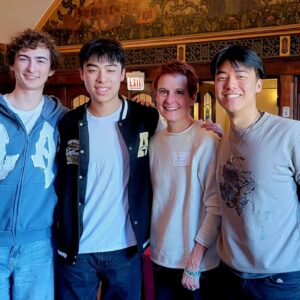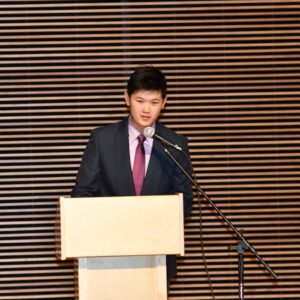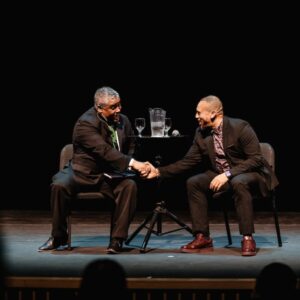This article was originally published in the fall 2012 Harker Quarterly.
Craig Pasqua, the tennis director at the upper school campus, took his tennis skills off campus this summer – all the way to Oklahoma City, Okla., to compete in the inaugural Jim Thorpe Games. The games benefit the Jim Thorpe Association, which encourages and celebrates excellence in athletes representing Indian nations. “My regular partner, John Blackhawk, who is the CEO of the Winnebago Nation in Nebraska, couldn’t make it so I teamed up with another partner,” Pasqua said. The last-minute change didn’t rattle him. In fact, the duo proved to have a winning chemistry, and they took home a bronze medal in doubles. Pasqua said he had also planned on entering the men’s 35 singles, but the category, it turned out, wasn’t being offered. He instead entered men’s singles, where he was consolation champion.
The games are named after legendary athlete Jim Thorpe, a Native American who competed in college football, professional football, Major League Baseball and the Olympics. All proceeds from the games go to benefit the Jim Thorpe Bright Path Youth programs and Native American diabetes research.
Victor Adler, a mathematics teacher at the upper school, also found an exciting outlet for his talents and experiences this summer. While teaching a pre-calculus summer class, he was offered a diagnostic test to give his students that would help show where each student stood in math placement. Coincidentally, a friend of his who teaches at the University of California, San Diego, called and said he was working on an interesting project – the same diagnostic test Adler had been offered. There was an opening on the test development team, and Adler was happy to join in.
“The cool thing is that these guys have collected a lot of data,” Adler said. “There’s a very methodical, rigorous method to producing questions on this test that allows you to collect good data. You can take the test online and get the data back nearly instantly.” The test helps teachers analyze where students are weak and at what stages. “I have a feeling the test will be a bit too easy for Harker students,” he said. “It’s aimed more at the general public.”
In addition to being part of great data collection and test development, Adler was also able to work with teachers from around the state, including University of California and California State University professors. “It gives me a greater connection to what is being taught at a large swath of educational institutions,” Adler said.
Chrissy Chang, K-8 P.E. department chair, was invited by the San Jose State University department of kinesiology to speak at the department dinner for the university’s 150th graduation in late May. Chang is a 1996 graduate of the department and a former student-athlete on the women’s basketball team. She currently serves on the board of directors for the SJSU Alumni Association and Order of Sparta.
Chang said as a proud alumna, it was an honor to be chosen as the speaker for this event and added that the university has helped shaped her into the person that she is today.
“The celebratory evening was great,” said Chang. “To be in the presence of faculty and staff who prepared me as well as the graduates to be leaders, difference-makers and problem- solvers within the kinesiology field was awesome. It was an opportunity to thank those who gave me the tools and foundation to be successful in my career and share my personal story with the graduates. Be a proud Spartan! Go Spartans! Hail Spartans!”
Chang teaches grade 8 P.E. and middle school health, is a member of the coaching staff and has worked in the past as a director of the summer program.






